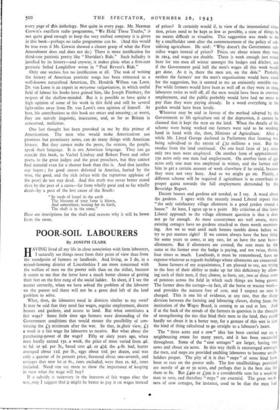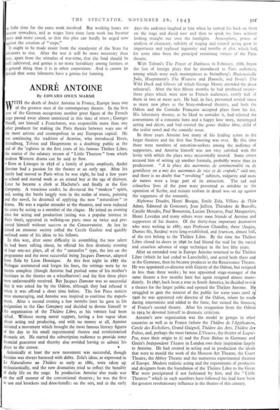POOR-SOIL LABOURERS
By JOSEPH CLARK AVING lived all my life in close association with farm labourers, I naturally see things more from their point of view than from the standpoint of farmers or landlords. And living, as I do, in a mixed-farming district of Lincolnshire I am more concerned with the welfare of men on the poorer soils than on the richer, because it seems to me that the latter have a much better chance of getting their feet on the first rung of the social ladder. In short, if I see the matter correctly, when we have solved the problem of the labourer on the poorer soil there will not be a great deal left of the land problem to solve.
What, then, do labourers need in districts similar to my own? It may be said that they need fair wages, regular employment, decent houses and gardens, and access to land. But what constitutes a fair wage? Some little time ago farmers were demanding of the Government conditions that would ensure the possibility of con- tinuing the £3 minimum after the war. So that, ingtheir view, £3 a week is a fair wage for labourers to receive. But what about the purchasing-power of the wage? Fifty or sixty years ago, when men locally earned 15s. a week, the price of meat varied from 4d. to 8d. or 9d. per lb., bread cost 4d. or 41d. the 4-lb. loaf, butter averaged about I'd. per lb., eggs about 'id. per dozen, coal was only a quarter of its present price, firewood about one-seventh, and cottages that now let at 6s., rates excluded, were then is. 6d., rates included. Need one say more to show the importance of keeping in view what the wage will buy?
If a subsidy is necessary in the interests of fair wages after the war, may I suggest that it might be better to pay it on wages instead
of prices? It certainly would if, in view of the international situa- tion, prices need to be kept as low as possible, a state of things by no means difficult to visualise. This suggestion was made to me by a smallholder soon after the commencement of the policy of sub- sidising agriculture. He said : " Why doesn't the Government sub- sidise wages instead of prices? Prices are about where they were in 1914, and wages are double. There is work enough just round here for too men all winter amongst the hedges and ditches, and if the Government paid half the men's wages all this work would get done. As it is, there the men are, on the dole." Probably neither the farmers' nor the men's organisations would have cared for the suggestion, but it seemed to me an eminently sensible one. For while farmers would have been as well off as they were in 1914, labourers twice as well off, all the men would have been in constant employment, and the public probably would have had no more to pay than they were paying already. In a word everything in the garden would have been lovely.
Whatever may be said in favour of the method adopted by the Government to lift agriculture out of the depression, it cannot be claimed that it kept the men on the land. When the details of the scheme were being worked out farmers were said to be working hand in hand with the, then, Minister of Agriculture. After a while Mr. Lloyd George declared in Parliament that farming was being subsidised to the extent of £3o millions a year. But the exodus from the land continued. On one local farm of 315 acres only two men were employed. On another farm of approximately 15o acres only one man had employment. On another farm of 450 acres only one man was employed in winter, and the farmer told him to get a certain amount of work elsewhere if he could, because they were not very busy. And so 'We might go on. Plainly, a different scheme will be required if agriculture is to contribute its proper quota towards the full employment demanded by the Beveridge Report.
Decent houses and gardens are needed, as I say. A word about the gardens. I agree with the recently issued Liberal repoit that " the only satisfactory village allotment is a good garden round a house." At least, I 'agree up to a point. My criticism of this latest Liberal approach to the village allotment question is that it does not go far enough. As most countrymen are well aware, many existing cottages have no gardens attached to them worth mention- ing. Are we to wait until such houses tumble down before we try to put matters right? If we cannot always have the best thing for some years to come, at any rate, let us have the next best— allotments. But if allotments are created, the rent must be the same as the farmer over the hedge is paying, and not twice, thrice, four times as much. Landlordi, it must be remembered, have no expense whatever as regards buildings where allotments are concerned.
Some farmers of my acquaintance, I am pleased to say, are trying to the best of their ability to make up for this deficiency by allow- ing-each of their men, if they choose, to have, say, two or three rows of potatoes across the field in which such things are being grown. The farmer does the cartage—in fact, all the horse or tractor work— and provides the manure free of cost, and I suspect no rent is charged. This is one bit of evidence, at any rate, that the sharp division between the farming and labouring classes, dating from the institution of the Wages Board, is coming to an end at last. And if at the back of the minds of the farmers in question is the thought of strengthening the ties that bind their men to the land, they could hardly set about it in a better way, for a gesture of this sort is just the kind of thing calculated to go straight to a labourer's heart.
The " three acres and a cow" idea has been carried out on a neighbouring estate for many years, and it has been successful throughout. Some of the "cow cottages" are larger, having two cows and about six acres. In this way thrift is encouraged amongst the men, and steps are provided enabling labourers to become small- holders proper. The pity of it is that " steps " of some kind have been so rare on the poorer soils. The few smallholdings provided
are mostly of 4o or 5o acres, and perhaps that is the best size for them to be. But L400 or £500 is a considerable sum for a working man to save, and therefore " steps," are essential. The great weak- ness of cow cottages, for instance, used to be that the men had so little time for the extra work involved. But working hours are shorter nowadays, and as wages have risen farm work has become more and more casual, so that this plea can hardly be urged now against the creation of " steps."
It ought to be made easier from the standpoint of the State for labourers to rise. After the war it will be more necessary than ever, apart from the stimulus of war-time, that the land should be well cultivated, and genius is no more hereditary among farmers as a general thing than it is in other connexions. And it cannot be denied that some labourers have a genius for farming.



























 Previous page
Previous page